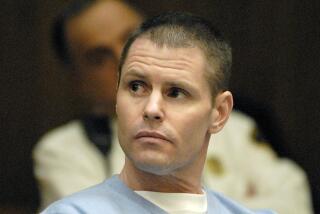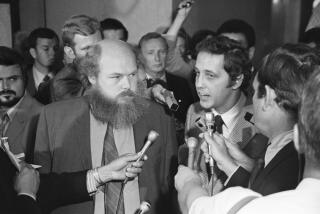At James ‘Whitey’ Bulger’s trial, glimpses of a Boston long gone
BOSTON — Every morning at dawn, a small line forms outside the federal courthouse here as residents old and young jostle for a seat on a hard wooden bench in courtroom No. 11. They come to watch the trial of James J. “Whitey” Bulger, the mob boss who was arrested in 2011 in Santa Monica after 16 years on the lam, and is now facing 19 counts of murder.
For many who have waited in line, and for much of the city, Bulger’s case feels plucked from a movie about the Boston of days past, when mobsters were gunned down on the street, authorities accepted bribes and a network of white Irish Catholic criminals and FBI agents ran amok.
Colorful characters from the past have traipsed through the courtroom as witnesses — Steve “The Rifleman” Flemmi, who says he extracted victims’ teeth so they couldn’t be identified; John “The Enforcer” Martorano, who claims to have killed 20 people but walks free; and Bulger himself, a lifelong tough guy who did time in Alcatraz and whose brother, Bill, took another path out of the housing projects and became the president of the Massachusetts Senate and of the University of Massachusetts.
“These guys literally got away with murder,” said Bernie Darcy, a Quincy, Mass., resident in his 50s who was the fourth person in line at the courthouse on a recent morning. “It was a different time.”
Closing arguments are scheduled to begin Monday. The case could go to the jury as early as Tuesday.
The Boston being dredged up in the trial bears little resemblance to the cosmopolitan city of today, known for its universities, hospitals and tech companies, with the sixth-highest percentage of foreign-born residents in the country. In Bulger’s day, the city was 70% white. Its residents erupted in riots over the idea of busing students to desegregated schools, and its baseball team was the last in the major leagues to integrate.
Even South Boston, or Southie, Bulger’s old stomping grounds, is starting to change, with million-dollar condos and gourmet food stores replacing his old haunts.
“It’s been a major transformation; the old ways have fallen by the wayside,” said Tom Whalen, a professor at Boston University. “Boston is not the way it was, thank God; the lost Boston wasn’t anything great.”
For some in the new Boston, the very fact of Bulger’s trial is a strange diversion in a city where he’s become all but irrelevant.
“It’s a waste of taxpayer money,” said Sharon Smith, 61, a lifelong South Boston resident who says she’d just as soon see Bulger thrown in jail and forgotten.
After all, Bulger is treated like some sort of celebrity defendant, rushed to court from prison in a motorcade, said Kevin Cullen, a Boston Globe columnist who’s also co-written a book about Bulger. Cullen suggested in a recent column that Bulger, now 83, should have been tried in California on gun possession charges, and then left in a prison there to contend with gang members who have never heard of the mob boss.
“A lot of people in Boston just feel like we’re playing to his ego,” Cullen said in an interview.
But even the most skeptical say the Bulger trial could be what allows Boston to fully leave its past behind. Bulger has left scars on the city — in a drug trade that still paralyzes parts of South Boston, in the dozens of families who are still looking for answers, and in a trail of government corruption so widespread that some observers still don’t think the truth has come out.
Boston needs this trial, Cullen said, in much the same way Mississippi needed to allow a court to try the killer of civil rights activist Medgar Evers 30 years after Evers’ death.
“We are shadowboxing with history right now,” Cullen said. “These are old murders, but it’s stuff that we have to resolve, which we’ve never resolved.”
For victims’ families, the trial might finally help hold both Bulger and the FBI accountable for errors in judgment that led to deaths. Many witnesses have been called to discuss Bulger’s role as a top FBI informant, handled by an FBI agent who also grew up in Southie, John Connolly, who tipped Bulger off about numerous things, including an impending arrest in 1994 that led to his flight to California. (During the trial, Bulger has cursed at some witnesses who called him an FBI informant.)
Connolly, who is serving time in a Florida state prison for his role in a Bulger-related Miami murder, also allegedly tipped off Bulger that a man named Edward Halloran was an informant. Halloran was shot to death in 1982, along with his neighbor, Michael Donahue, who was giving Halloran a ride home. Donahue had no ties to criminal activities. His widow, Patricia, has come to court nearly every day, accompanied by her sons.
“I want to know everything — but I want to know about the FBI more than anything,” she said.
Certain that FBI agents had been complicit in Halloran’s death, the Donahues pursued a civil suit against the Justice Department, but an appeals court ruled the statute of limitations had expired. Still, this trial has brought their story to Boston’s attention, and Donahue’s sons have appeared on local TV stations frequently, reminding viewers of the FBI’s role.
Dick Lehr, a Boston University professor and coauthor of “Whitey: The Life of America’s Most Notorious Mob Boss,” said he hoped the trial would hold the FBI accountable.
“This trial should have happened a long time ago, and it has the whole quality of a period piece at this moment,” he said. “But I don’t think it’s irrelevant, because it’s a reminder of how deeply flawed and lawless the FBI was in Boston, and I don’t think anyone should ever forget that.”
Some reminders of the government’s relationship with criminals paraded through court — from their homes rather than from jail because of bargains struck with a government intent on nabbing Bulger.
They include Patrick Nee, who has been implicated as an accomplice in five killings in Bulger’s case and is set to star in an upcoming Discovery Channel show about Boston bookmakers; Kevin Weeks, a Bulger protege who served five years in prison but testified that he helped Bulger kill people; and Martorano, the self-described killer of 20 people who served only 12 years in prison.
Still, the old gangsters walking into court seem utterly unable to terrorize Boston anymore.
In the new South Boston, Triple O’s, an old Bulger hangout, is now a sushi bar. Across the street is a Starbucks. The house where Bulger and Flemmi allegedly stashed bodies is freshly painted and sits on a tree-lined street packed with fancy cars and strollers. Real estate prices are so high that some old-timers can’t afford to stay.
Even the most notable violence to strike the city recently, the Boston Marathon bombings, seems to have inspired more unity than fear.
Liam Carnahan, 27, was strolling on the newly rehabbed South Boston waterfront recently, not far from the courthouse where Bulger is being tried. Carnahan once had a goldfish named Whitey Bulger — a joke, he said. The name doesn’t strike fear in his heart, the way it might have for a young man walking down the streets of Southie 40 years ago.
“The mob culture is gone, and it’s a much safer place to live now,” he said. “It doesn’t have that dark side from the past anymore.”
More to Read
Sign up for Essential California
The most important California stories and recommendations in your inbox every morning.
You may occasionally receive promotional content from the Los Angeles Times.











